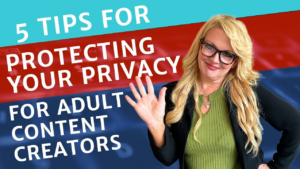
- Originally Published on October 25, 2024
How to Prevent Doxxing in 5 Steps
Doxxing, the malicious act of revealing someone’s personal information online without their consent, can lead to severe emotional distress, financial losses, and even physical harm. In this article, I will share my insights on how you can safeguard yourself and your loved ones from doxxing attacks.
What is Doxxing?
Doxxing (sometimes spelled “doxing”) is the act of publicly revealing someone’s personal and /or private information. Social media platforms such as X (Twitter), Facebook, and Instagram generally consider sharing someone’s home address, driver’s license, social security number, personal phone numbers, bank account information and/or private healthcare information as acts of doxxing. This private information is publicly shared on the Internet, typically with malicious intent.
Understanding the Risks and Consequences of Doxxing
Doxxing is not just a minor inconvenience; it can have far-reaching consequences that impact every aspect of your life. The emotional toll of having your personal information exposed online can be overwhelming. Victims of doxxing often experience anxiety, depression, and a profound sense of vulnerability. They may feel like their privacy has been violated and that they have lost control over their own lives.
Beyond the emotional impact, doxxing can also have severe professional repercussions. Imagine having your employer or colleagues stumble upon sensitive personal information about you online.
The financial consequences of doxxing can be equally devastating. Victims may face identity theft, fraudulent charges and even blackmail attempts. The time and resources required to resolve these issues can be substantial, adding to the already heavy burden of dealing with the emotional fallout.
It is crucial to understand that doxxing is not just an online problem; it can have genuine, offline consequences. In some cases, doxxing has led to physical harassment, stalking and even physical violence. As someone who has worked with domestic violence survivors and other vulnerable populations, I know firsthand how terrifying it can be to have your personal information fall into the wrong hands.
Identifying Your Digital Vulnerabilities
To protect yourself from doxxing, you must first understand where your vulnerabilities lie. In today’s digital age, we leave a vast trail of personal information online, often without realizing it. As an attorney who has conducted numerous digital investigations, I have seen how seemingly innocuous pieces of information can be pieced together to create a comprehensive profile of an individual.
To assess your online presence for doxxing risks, follow these steps:
- Conduct a thorough search of your name and any variations (including nicknames or aliases) on search engines like Google, Bing, and Yahoo. Make a note of any personal information that appears, such as your address, phone number or email address.
- Review your social media accounts and check your privacy settings. Ensure that your profiles are set to private and that you are not sharing sensitive information publicly. Be mindful of what you post, as even seemingly harmless updates can reveal details about your location, relationships or daily routines.
- Check for any old or inactive online accounts that may contain personal information. This could include former social media profiles, online forums or even comments you made on blogs or articles years ago. If possible, delete these accounts or request that your information be removed.
- Use people-search websites like Whitepages, Spokeo, and BeenVerified to see what information is available about you online. These sites aggregate data from various public records and can be a goldmine for potential doxxers. Make a list of any inaccurate or sensitive information you find.
- Consider your professional online presence as well. Review your company website, LinkedIn profile and any industry-specific directories or databases. Ensure that you are not sharing more personal information than necessary and that your privacy settings are appropriately configured.
By conducting a thorough audit of your online presence, you can identify potential vulnerabilities and take steps to mitigate them. Remember, the goal is not to erase yourself from the Internet entirely but rather to control what information is publicly available and ensure that it cannot be used to harm you.
Strengthening Your Social Media Privacy
Social media platforms are a prime target for doxxers, as they often contain a wealth of personal information that can be easily accessed and exploited. To protect yourself from doxxing on social media, it is essential to fortify your accounts with strong privacy settings and best practices.
There are general best practices that you should follow across all social media accounts:
- Use strong, unique passwords for each account and enable two-factor authentication when available.
- Be cautious when sharing personal information, even in private messages or closed groups.
- Avoid posting about your location in real time or sharing details about your daily routines.
- Be mindful of what you post about others, as it could be used to target them for doxxing as well.
- Regularly review your friend and follower lists and remove individuals you do not know or trust.
By implementing these privacy settings and best practices, you can significantly reduce your risk of being doxxed on social media. However, it is important to remember that no platform is entirely secure, and you should always exercise caution when sharing personal information online.
Securing Your Personal Data and Online Accounts
In addition to strengthening your social media privacy, it is crucial to secure your personal data and online accounts across all platforms. This includes your email, banking, shopping, and any other accounts that contain sensitive information.
To safeguard your accounts, follow these key security measures:
- Use strong, unique passwords for each account. Avoid using easily guessable information like birthdays or pet names and never reuse passwords across multiple accounts.
- Enable two-factor authentication (2FA) whenever possible. This adds an extra layer of security by requiring a second form of verification, such as a code sent to your phone, before allowing access to your account.
- Be cautious when using public Wi-Fi networks, as they can be easily compromised by hackers. If you must use public Wi-Fi, consider using a virtual private network (VPN) to encrypt your internet connection and protect your data.
- Keep your software and operating systems up to date with the latest security patches and updates. This helps protect against known vulnerabilities that could be exploited by doxxers or other malicious actors.
- Use a password manager to store and generate strong passwords for your accounts securely. This eliminates the need to remember multiple complex passwords and ensures that each account has a unique, secure password.
In addition to these technical measures, it is important to be mindful of your online behavior and the information you share. Be cautious when opening emails or messages from unknown senders, as they may contain malware or phishing attempts designed to steal your personal information. Avoid clicking on suspicious links or downloading attachments from untrusted sources.
Opting Out of Data Brokers and People-Search Sites
Data brokers and people-search websites are a significant source of personal information for potential doxxers. These sites aggregate data from various public records and online sources, creating detailed profiles of individuals that can be easily accessed by anyone willing to pay a small fee.
To minimize your exposure on these sites, you can opt out and request that your personal information be removed. Here is a step-by-step guide to opting out of some of the most popular data brokers and people-search sites:
- Whitepages: Visit the Whitepages opt-out page (https://www.whitepages.com/suppression-requests) and follow the instructions to submit a removal request. You will need to provide your name, address, and a valid email address. Whitepages will send a confirmation email with a link to complete the opt-out process.
- Spokeo: Go to the Spokeo opt-out page (https://www.spokeo.com/optout) and enter your name and email address. Spokeo will send a confirmation email with a link to complete the removal request. You will need to provide a valid reason for the removal and may be required to provide additional information to verify your identity.
- BeenVerified: Visit the BeenVerified opt-out page (https://www.beenverified.com/app/optout/search) and search for your name. Click on the listing you want to remove and follow the instructions to submit a removal request. You will need to provide a reason for the removal and may be required to provide additional information to verify your identity.
- Intelius: Go to the Intelius opt-out page (https://www.intelius.com/opt-out) and follow the instructions to submit a removal request. You will need to provide your name, address, and a valid email address. Intelius will send a confirmation email with a link to complete the opt-out process.
- MyLife: Visit the MyLife opt-out page (https://www.mylife.com/privacy-policy#opt-out) and follow the instructions to submit a removal request. You will need to provide your name, address, and a valid email address. MyLife will send a confirmation email with a link to complete the opt-out process.
It is important to note that the opt-out process can be time-consuming and may require you to provide additional information to verify your identity. While opting out can significantly reduce your exposure on these sites, it may not remove your information entirely, as some data may be sourced from public records that cannot be easily removed.
Responding to Doxxing Attempts and Seeking Support
Despite your best efforts to protect your personal information, you may still find yourself the target of a doxxing attempt. If you discover that your personal information has been exposed online, it is essential to act quickly to minimize the potential harm.
Here are the immediate steps you should take if you’ve been doxxed:
- Document everything: Take screenshots of any posts, messages, or websites where your personal information has been shared. This evidence may be necessary for legal action or to support removal requests.
- Report the incident: Contact the relevant platforms or websites where your information has been posted and request that it be removed. Many social media platforms and websites have specific policies against doxxing and will take action to remove the offending content.
- Secure your accounts: Change your passwords and enable two-factor authentication on all of your online accounts, especially those that may have been compromised. This will help prevent further unauthorized access to your personal information.
- Alert your support network: Inform trusted friends, family members, and colleagues about the doxxing incident. They can help monitor for any additional exposure to your information and provide emotional support during this challenging time.
- Contact law enforcement: If you feel that your safety is at risk or if the doxxing incident involves threats of violence, contact your local law enforcement agency. They can help assess the situation and provide guidance on the next steps.
If the doxxing incident has caused harm to your reputation or professional standing, you may want to consider legal action. An experienced attorney who specializes in online privacy and defamation can help you understand your options and guide you through the process of seeking legal recourse.
How Minc Law Can Help You Protect Your Online Privacy
At Minc Law, we understand the devastating impact that doxxing can have on individuals and families. As a leading internet defamation law firm, we have the knowledge, experience, and resources to help you navigate this challenging situation and take proactive steps to protect your online privacy.
Our team of skilled attorneys and paralegals can assist you with:
- Removing personal information from data brokers and people-search sites: Our firm has experience navigating the opt-out process for popular data brokers and people-search websites. We can handle the time-consuming and often complicated process of removing your personal information from these sites on your behalf.
- Responding to doxxing incidents: If you have been the victim of a doxxing attack, our team will act quickly to help you document the incident, report it to the appropriate authorities, and secure your online accounts. We will also explore all available legal options.
- Developing a customized online privacy protection plan: We will work closely with you to create a personalized strategy for safeguarding your online privacy going forward. This may include recommendations for strengthening your social media privacy settings, securing your personal data and online accounts, and monitoring your online presence for any potential threats.
- Providing ongoing education and support: Our firm is committed to empowering our clients with the knowledge and tools they need to protect their online privacy. We offer ongoing education and resources to help you stay informed about the latest trends in online privacy and security, as well as support and guidance whenever you need it.
At Minc Law, we believe that everyone has the right to privacy and security online. If you are concerned about your online privacy or have been the victim of a doxxing attack, we are here to help. Contact us today by phone at 216-373-7706 or by filling out our online contact form to schedule a confidential consultation and take the first step toward protecting your digital identity and reputation.
Get Your Free Case Review
Fill out the form below, and our team will review your information to discuss the best options for your situation.
This page has been peer-reviewed, fact-checked, and edited by qualified attorneys to ensure substantive accuracy and coverage.



